The deal announced last week between the state of Sarawak, Petronas and the federal government reflects pragmatic choices on all sides – as Sarawak accepted the legitimacy of the 1974 Petroleum Development Act (PDA) and agreed to a sizeable payment of RM2 billion for the payment of state sales tax on petroleum products.
Both Sarawak Chief Minister Abang Johari Openg and Prime Minister Muhyiddin Yassin (it would seem) secured a political win in their contests to hold onto power. For Petronas, the deal assures that the legal challenge posed over oil royalties by the Sarawak government contesting the legitimacy of the PDA has been dismissed.
This deal is big news – it comes after similar arrangements were reached with Kelantan and Terengganu last year, and amidst ongoing discussions with Sabah and at a time when government revenues from oil and gas are facing unprecedented challenges. No doubt, the recent deals’ terms and compromises will continue to be questioned, as the politics surrounding oil revenue remains highly contentious. In fact, for Abang Johari (below), the deal may have given the opposition an issue in the coming elections.
This piece lays out how potential contractions in revenue from oil and gas may affect the government’s capacity to address the socio-economic dimensions of the crisis and details how oil royalties have recently split over into federal-state relations. As the information on these matters is not regularly published, it relies on uneven available reports. The figures should be seen as estimates.
It argues that the government of the day needs to take more proactive steps to reduce the impact of global shocks on revenue and to further collaborate with the states to reduce political tensions over oil royalties/revenues.

The announcement of a working committee involving Sarawak and the Finance Ministry is a good first step, but these discussions can be broadened to include other states and bring in more representation of stakeholders from individual states. The Covid-19 crisis provides an opportunity to consider new measures that strengthen not only revenue but how Malaysia’s natural resource assets are being managed.
An oil bind
Over the last two months, news reports have highlighted the crash in oil prices, shown below. For the first time in history, US oil prices went negative as Covid-19 reduced demand. Never before has there been this confluence of negative forces: an international public health crisis, a global recession, wide-ranging global supply chain disruptions, ongoing trade tensions, intensive domestic nationalist political pressures to break any future production agreements after a recent history of failed production agreements.
While oil prices are expected to recover as economies open up – and it has already modestly recovered since its low last month – it is not expected to reach the levels assumed in the government’s Budget 2020 calculations. Malaysia faces a serious revenue shortfall.
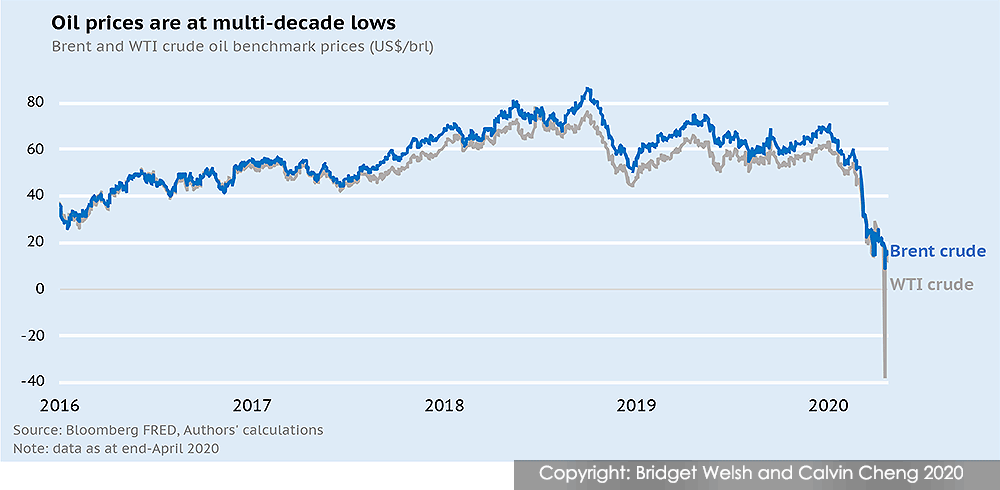
The Muhyiddin government is caught in a difficult position – reeling from the financial effects of global shocks while at the same time facing state governments that want their share of funds from oil. These funds are needed by state governments to shore up their support, especially those facing elections. At the same time, the Muhyiddin government depends on the support of representatives from these states in facing its own political battles.
Minimally, elections need to be held in three years, but they are likely to be sooner given the country’s political fragmentation. The combination of economic and political realities has placed the federal government in a bind – with the Sarawak oil deal one of the attempts to reduce tensions and move forward.
Decimating revenue effects
At the heart of the problem is money. Over the past few years, oil-related revenues, including Petronas dividends, have made up about 20% of total government revenue on average. The oil and gas sector includes not only exports, but also extensive downstream activities in manufacturing, retail, and services – so this figure should be seen as a low estimate.
The current decline in oil and gas prices will diminish revenue levels – not just in the short term, but over the medium term due to how oil and gas production contracts are set up. Even factoring in a potential increase in prices and the variable effects and complexities of sources of the oil and gas revenue, the Covid-19 effect on the government’s oil and gas revenues will be significant.
Our estimates using government budget statistics suggest that every US$1 decline in crude oil prices will reduce government revenues by approximately RM330 million – and potentially even more if we include Petronas dividends.
Assuming an average (Brent crude) oil price of US$40 per barrel for 2020 (it is trading close to US$30 per barrel at the time of writing), this implies a decline in government oil-related revenues of RM7.3 billion as compared to the oil price assumption used in Budget 2020 of US$62 per barrel. This could widen the fiscal deficit, potentially extending it to nearly 6% of GDP (as shown below), far from the original target of 3.2%. While oil prices will inevitably change, Covid-19 is expected to remain a health threat and will impact demand until a vaccine is developed and disseminated.
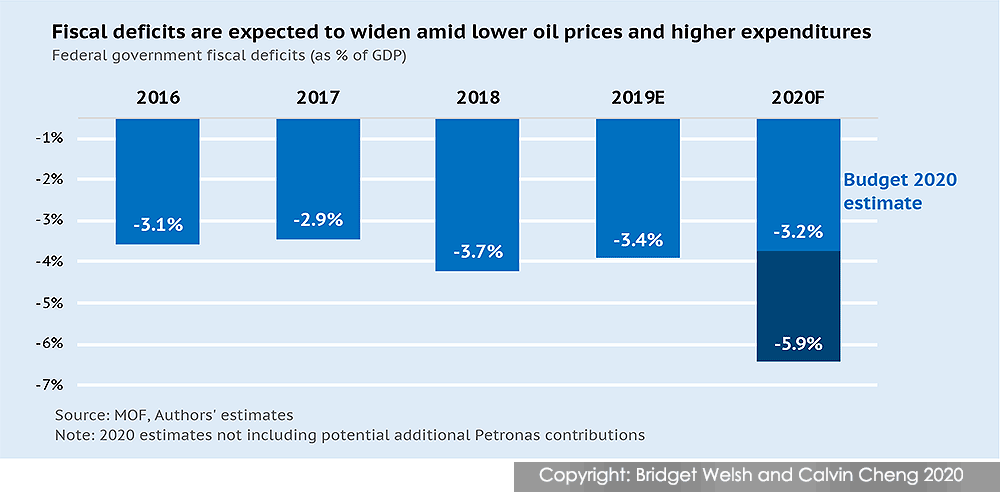
To put this potential revenue loss in perspective, this means that the magnitude of the decline may be over half of what the government has allocated to spend on Bantuan Prihatin Nasional (BPN), RM12.2 billion.
The government has already promised RM35 billion in its three stimulus packages since the beginning of the year – and more will be needed to kick-start the economic recovery post-movement control order (MCO) and shore up the social safety net as vulnerabilities ahead mount. The lines of people outside pawn shops are just the tip of what is coming in the difficult days ahead.
Already, jobs data released on Friday indicate that 610,500 people were unemployed in March – increasing the national unemployment rate to 3.9% from 3.3% a month earlier – and this was only two weeks into the MCO. After a full month of movement restrictions in April, the number of unemployed persons will be much worse.
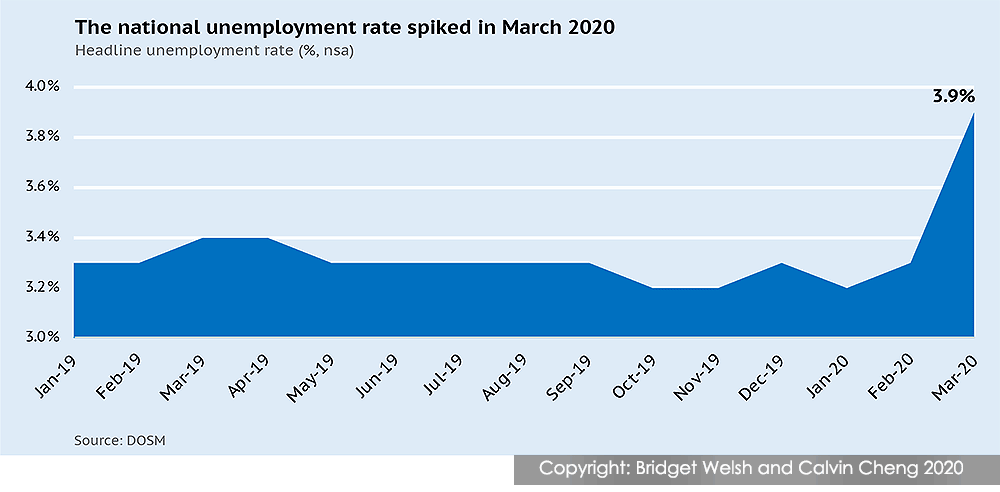
The fact is revenue has long been a problem for Malaysia. Total tax revenues (to GDP) have been declining since the 1980s and is now currently at a historical low. Large segments of the population are not subject to direct taxes, and indirect tax revenues have already been curtailed by the removal of the Goods and Services Tax (GST).
This continued decline in tax revenues will only continue to increase reliance on oil-related revenues and by extension, on Petronas directly. With the 12th Malaysia Five-Year Plan expected to be announced this year, any revenue shortfalls may have spillovers on much-needed infrastructure and modernisation projects.
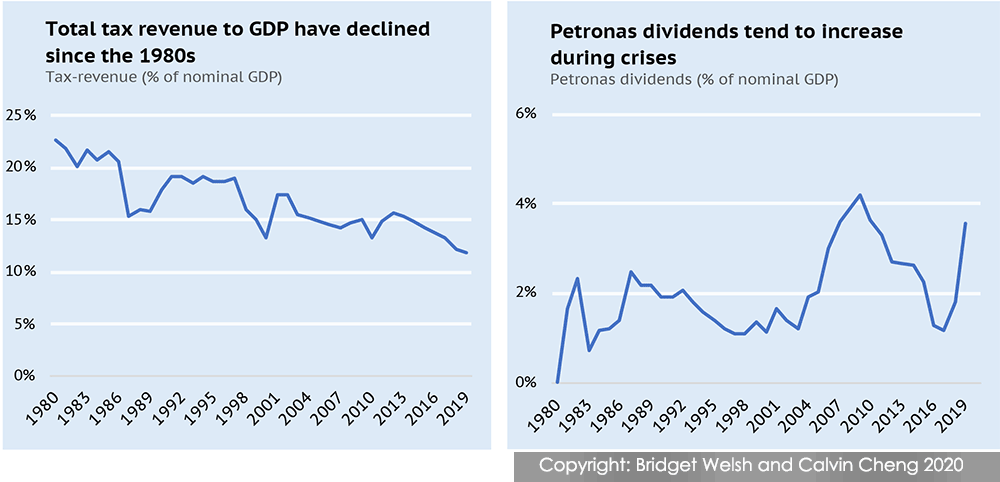
In times of crises, the pattern has been to turn to the nation’s (or rather the prime minister’s) ‘cash cow’. A Global Fortune 500 corporation, Petronas is estimated to be worth RM862 billion, employs about 48,000 people, and many more among its 100 over subsidiaries and downstream businesses. It is widely praised as a well-run organisation that has been the guardian of national assets. It, like others in this sector, is facing greater uncertainty. Petronas reported profit earnings of RM40.5 billion in 2019 was down 27% from the previous year.
Petronas has been an important lifeline for national finances. In each of Malaysia’s three recent major economic crises in 1986, 1997 and 2009, Petronas played an important role by supporting the federal government either through contributing higher dividends or through direct bailouts for distressed government-linked firms. In 2019, after the 1MDB scandal, its RM54 billion contribution alone made up 4% of total GDP. An additional RM30 billion was earmarked to pay income tax and GST refunds.
Any government of the day is likely to turn to Petronas again in this Covid-19 crisis. Reports are already suggesting that RM24 billion dividend it scheduled to give this year will be increased by another RM10 billion, but this matter and amounts have yet to be finalised. What is clear, however, is that the federal government – and with intensive pressure to offset the hardships of the public – relies heavily on a company that is itself facing stress in an increasingly uncertain global environment.
Political spillovers
To complicated matters further, the issue of oil is inherently political in Malaysia – as Friday’s announced deal shows.
Despite its impressive performance, there are some controversies surrounding the management of the national corporation; Petronas reports to the prime minister and has effectively no accountability to parliament or the public. There have been more measures to increase transparency and anti-corruption efforts in recent years, driven by both market and political realities, but established practices do not encourage accountability. The prime minister has disproportionate influence over funds that are in fact public funds owned by the rakyat.
This has meant that there has been turnover in the company’s management when the country has a new leader at the helm. So far, since the collapse of the Pakatan Harapan government, no new chairperson has been announced, but there also have been no assurances that the current management can move ahead with planning for the challenges the company faces, as the cloud of politics obscures the direction of Petronas’s leadership.
Federal-state tensions
Oil and gas – or specifically the royalty from these resources – has also been at the core of tensions between the federal and state governments. Four states in particular – Sarawak, Sabah, Terengganu and Kelantan – have demanded a greater share of the oil/gas revenue their states provide. The 1974 Petroleum Agreement stipulated a share of 5% of revenue. As there has not been full transparency in how profits are measured, it is not fully clear exactly how the 5% is calculated.
The last two years have seen intensive wrangling over these royalty funds. Kelantan has not officially been included as qualifying for royalty payments, in part due to disagreements about the offshore fields as well as its status as the longest PAS governed state. There has however been movement towards giving the revenue-strapped state oil royalties.
Kelantan was able to reach an agreement for a one-off payment in November last year of RM400 million payment after intensive back and forth over state debt and a demand of RM1 billion. The disputes over the ownership over the offshore oil fields remain, but steps taken in the last year point toward greater acceptance of Kelantan as an oil producer.
Terengganu received its 5% oil royalty of over RM1 billion but accepted a 25% reduction in the royalty going forward to settle its debts with the federal government for infrastructure projects. Under Mahathir’s Harapan government, both east coast states were able to get funds deposited directly into state coffers rather through another arrangement (separate ‘wang ehsan’ or ‘goodwill’ distribution) that would disempower the PAS state governments.
The weaker financial position of these states, especially debt to the federal government, undercut their leverage with the federal government, but deals were reached that favoured the leadership of the two PAS states. Our estimates suggest a real dependence on oil royalties for these states – reaching over 60% of state budgets.
As oil profits contract, the royalty will decrease and this will negatively impact the revenues of these states that remain burdened by federal debt and with limited funds for state expenditures. This will affect the ability of these states to shore up political support through state spending, a matter complicated by rising expectations of greater funds for the states as part of the Perikatan Nasional (PN) coalition.
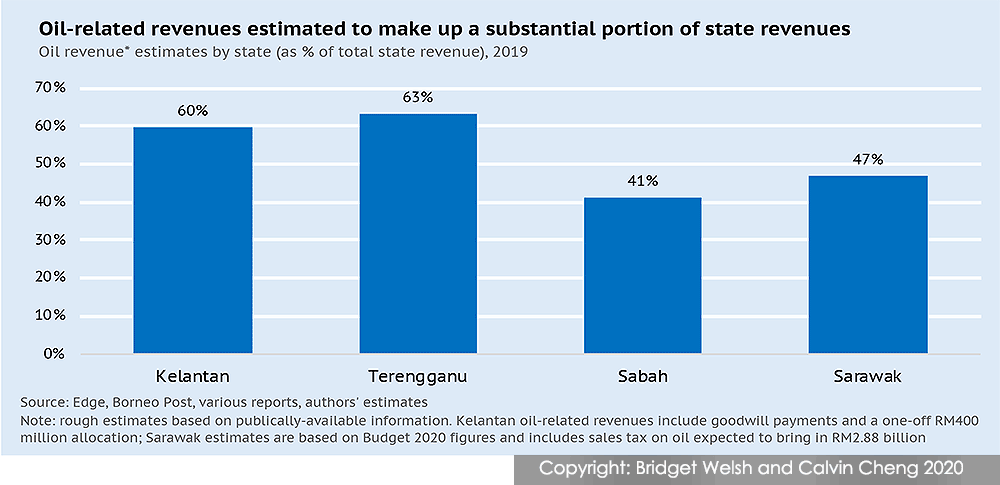
While deals were reached reasonably amicably with Kelantan and Terengganu (especially given the traditional animosity over this matter when Umno was in federal government), this was not the case with Borneo states. The rise of state nationalism and the promised 20% royalty payment in Harapan’s GE14 manifesto created expectations, especially since support from Sabah and Sarawak was seen as critical for the Harapan government’s majority.
While the figure of 20% was promised by Harapan to Sabah and Sarawak, the amount delivered was considerably less. Petronas came out late last year to state that additional contributions beyond the mandated 5% were not viable, due to the low 3.7% margin the corporation makes from its deals in production costs. There have been questions whether the federal government should give up its rights to oil and gas revenue altogether, increasing the share to these states to 10%.
The contestation over oil and gas in the Borneo states moved from royalty payments to ownership of companies, imposition of state taxes and into the courtroom. Sarawak led the way, demanding control over companies involved in this sector. This year the state took charge of the Sarawak-based Petros, formed in 2018, wrestled from Petronas and fully in state hands.
Sabah has also increased its state involvement in this sector, initially with large investments on the state’s west coast. Recently, the Warisan government formed the state-dominated Sabah International Petroleum, aiming to better capitalise on gas reserves. These ventures increase state control over oil and gas assets, but the companies themselves face a challenging environment ahead for earnings.
Beyond displacing Petronas, the Sarawak government imposed state taxes on petroleum products in the state early last year, including on Petronas. The dispute ended up in court, raising fundamental questions about the legality of oil and gas revenues. Sarawak argued that the 1958 Oil and Mining Ordinance should be the foundation for oil and gas revenue rather than the 1974 Petroleum Development Act and managed to win a few early decisions in their favour.
The deal announced on Friday indicates that the Sarawak government accept the 1974 law, the 5% royalty share – and opted for funds in hand and compromise over the state tax funds. Inevitably, there will be others who see this decision as undermining possible additional royalties and other funds for the state in the future. The opposition is already questioning the deal and its rational – a by-product of inadequate stakeholder buy-in. Contestation over the deal assures that it will be an election issue in the Sarawak polls which need to be scheduled by September next year.
The next federal-state oil battleground is Sabah. Reports suggest that the oil royalty payment and revenue from sales in this sector have not been settled. Sabah was reportedly promised RM1.7 billion in oil royalty, based at a price of over US$62 per barrel – a figure that is now not tenable.
More quietly on Friday, a new committee Majlis Tindakan Pembangunan Negeri met to discuss how to channel other federal funds due to the state to PN political allies in Sabah rather than the state government – a decision that will only stoke federal-state tensions further but reflects past practices against the then PBS government and follows similar attempts to weaken state governments such as Terengganu. It is not yet clear whether the jurisdiction of this committee will include oil revenues.
Not surprisingly, these tensions extend beyond the state dynamics into the battle in parliament as well – as Sabah Chief Minister Shafie Apdal did call for a vote of confidence for Dr Mahathir Mohamad as prime minister and has opted not to side with PN.
In Malaysia’s fragmented political reality, any government will need the support of the Borneo states to form the federal government. Also, while these states have comparative stronger financial positions than Kelantan and Terengganu – especially Sarawak with its reserves – oil royalty payments nevertheless make up the largest contributor to state coffers; an estimated of 41% in Sabah and 47% in Sarawak.
These issues – Petronas management, tensions over royalty payments and oil and gas assets/sales, as well as lower state revenues – are delicate to manage in good times. In the ongoing global economic crisis, with Malaysia’s fragmented government with an untested majority, these add to political uncertainty; applying leverage could in fact be a political leveller and making deals that could in fact have spillovers that ironically intensify tensions.
Ameliorating problems
As a small producer and consumer, Malaysia has limited control to address shifts in the oil and gas sector. It can however be proactive in using this crisis as an opportunity to rebalance its economy, strengthen revenues, build stronger political cooperation over managing oil and gas, and offset the negative effects of the global pandemic and economic slowdown.
We offer three concrete suggestions moving forward:
1. Improve governance: Strengthen Petronas management by supporting leadership decisions that enhance its capacity to weather economic difficulties ahead. A critical component of this is to improve Petronas’s transparency and public accountability and to increase the professional oversight over the management of political funds beyond the prime minister. It is important to bring in more non-partisan professionals into oversight.
2. Broaden engagement with stakeholders: Reach out to the states and localities that are in the front line of the negative effects of a contraction in oil and gas, assuring that they are valuable stakeholders in the economic recovery process and will also receive their share of available profits. Using oil-related funds as a political tool will only escalate tensions and fragment politics further. Given the high level of poverty and persistent infrastructure needs in the states with oil and gas, there needs to be more inclusion and fairness in revenue distribution.
The federal government should meaningfully engage in dialogue and consultations and respect all state governments to prevent further undercutting the economy and assuring political stability to manage ongoing headwinds. Given the fractious nature of politics at both the federal and state level, it is important to have broad consultations on deals made to include the opposition and public, as exclusion will inevitably only serve to perpetuate tensions over oil revenues.
3. Enhance revenue sustainability: To bolster government revenues and reduce dependence on oil-related revenues including Petronas, the government needs to consider new measures and revamp its fiscal system. Revenue sustainability strategies will ultimately hinge on broadening the tax base through increasing tax compliance, while increasing the coverage of existing indirect taxes. New types of taxes on capital gains, wealth, or the reinstatement of a consumption tax may eventually need to be considered – all keeping in mind that the recovery ahead for businesses and workers will be challenging and take time.
There will be a need for stakeholder buy-in across the political divide. Any overhaul needs to have a careful review of fiscal governance standards, notably increasing the transparency of off-budget liabilities to bolster accountability and earn public support. Taxpayers deserve better information on how their money is being taxed and spent.
The fallout from Covid-19 extends well beyond public health and economic growth – it goes to the heart of Malaysia’s government finances and the fractiousness of state-federal relations. An approach that looks forward, brings key actors to the table and considers innovative measures that enable spending for Malaysians and a post-Covid-19 recovery offers the most protection – it assures that the slick slide of oil is managed rather than leaving a dangerous spill.
Article by
Bridget Welsh and Calvin Cheng
first appeared on MalaysiaKini on 10 May 2020





